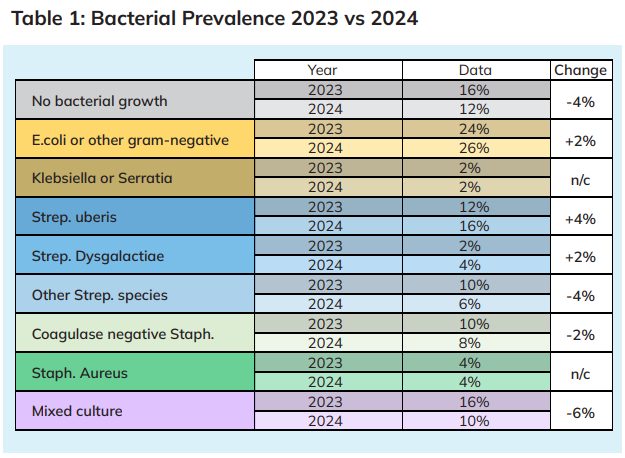New data shared at the British Mastitis Conference in 2024 shows that a farmer utilising Mastatest would potentially be able to rule out the need for antibiotic treatment in 40% of all presenting clinical mastitis cases.
Identifying mastitis cases where antibiotics are not beneficial:
The 2024 dataset showed:
12% of all clinical mastitis samples tested had no bacterial growth;
26% of samples contained only E. coli or other gram-negative bacteria; and
2% contained only Klebsiella/Serratia species
Antibiotic sensitivity testing confirmed that those samples where E. coli/other gram-negative, or Klebsiella/Serratia were the causative bacteria, 100% were identified as having a low chance of responding to benzylpenicillin or cloxacillin (Minimum Inhibitory Concentration (MIC) = 4 or >4), and >98% were identified as having a low chance of responding to cephalexin. This antibiotic sensitivity data underlines that treating these mastitis cases with antibiotics is not likely to be beneficial.
Taken together, a farmer utilising Mastatest would be able to rule out the need for antibiotic treatment in 40% of all presenting clinical mastitis cases.
Identifying the bacterial species, and the right antibiotic:
Other common bacteria identified were Strep. uberis (16%), Strep. dysgalactiae (4%) other Strep. species (6%), other gram-positive (8%), Coagulase negative staphylococci (8%), and Staph. aureus (4%).
Detailed data on antibiotic sensitivity again showed that for most bacterial species there is no ‘one-size-fits all’ choice of optimal antibiotic. This supports the rationale of having sensitivity data to inform the correct selection.

Find out more:
Data from the expanding Mastatest cohort of clinical mastitis samples within the UK presents a unique and ongoing opportunity to understand the causes of mastitis and ensure the most effective treatment and management plans are being implemented on-farm.
To request a copy of the abstract, or learn about how easy using the Mastatest diagnostic system could be for your farm, contact us today
